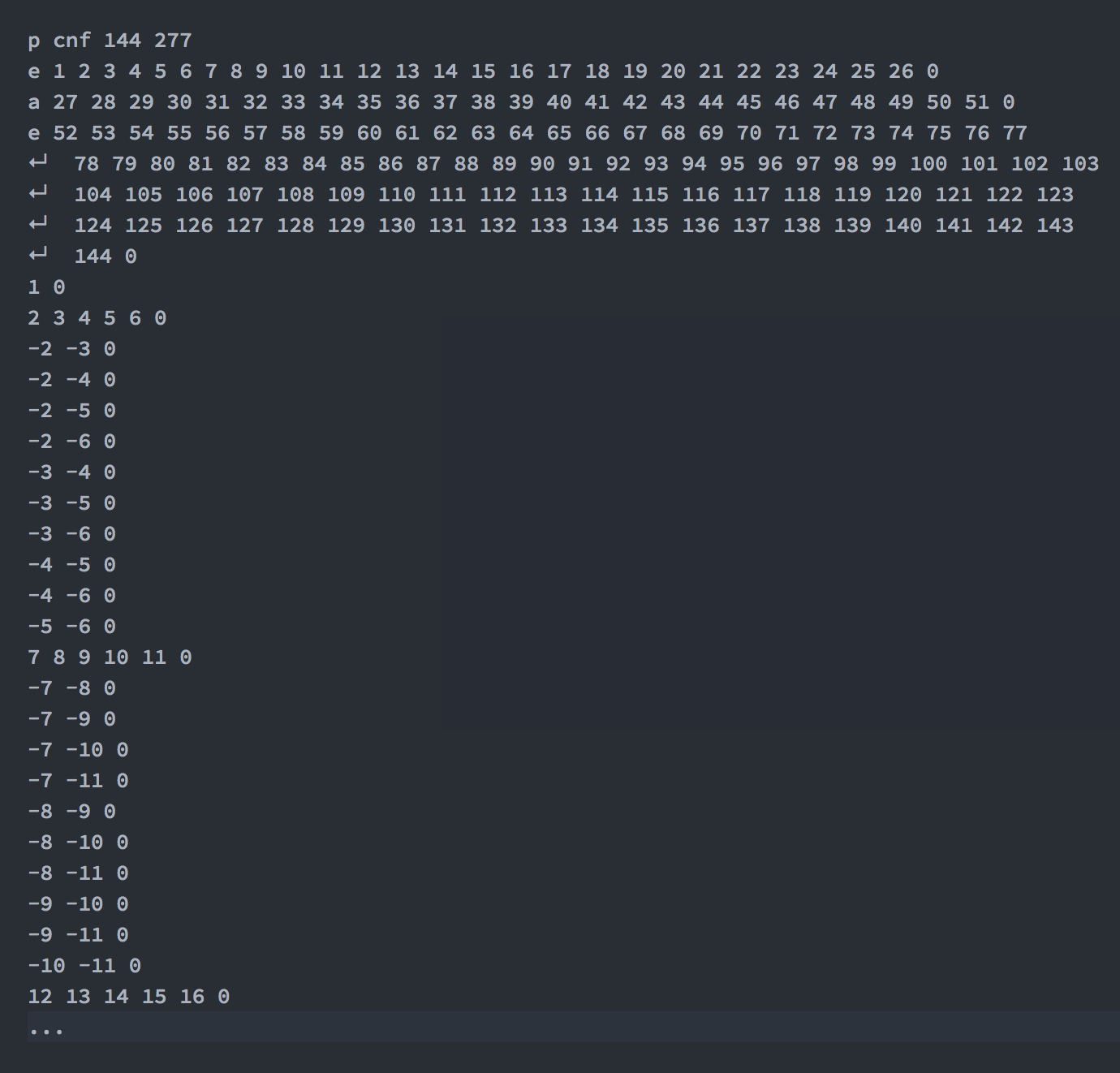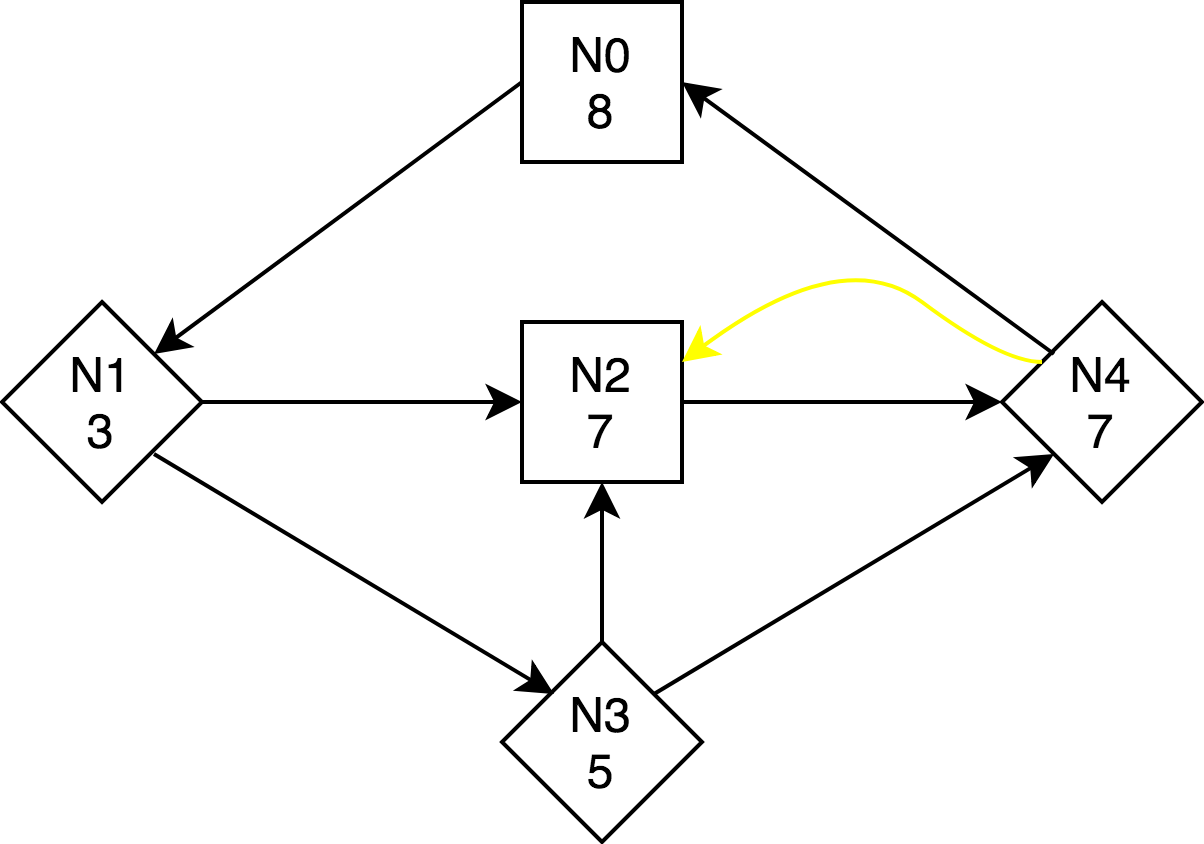Who wants to use QBF solvers...
Without writing QBF?
Matthias van der Hallen (KU Leuven)
A higher level modelling language
Second Order (SO) Logic
A translator (grounder) to QBF
QBF
Modelling
language
Grounder
Goal
-
Make models shorter

p cnf 144 277
e 1 2 3 4 5 6 7 8 9 10 11 12 13 14 15 16 17 18 19 20 21 22 23 24 25 26 0
a 27 28 29 30 31 32 33 34 35 36 37 38 39 40 41 42 43 44 45 46 47 48 49 50 51 0
e 52 53 54 55 56 57 58 59 60 61 62 63 64 65 66 67 68 69 70 71 72 73 74 75 76 77
⏎ 78 79 80 81 82 83 84 85 86 87 88 89 90 91 92 93 94 95 96 97 98 99 100 101 102
⏎ 103 104 105 106 107 108 109 110 111 112 113 114 115 116 117 118 119 120 121 122 123
⏎ 124 125 126 127 128 129 130 131 132 133 134 135 136 137 138 139 140 141 142 143 144 0
1 0
2 3 4 5 6 0
-2 -3 0
-2 -4 0
-2 -5 0
-2 -6 0
-3 -4 0
-3 -5 0
-3 -6 0
-4 -5 0
-4 -6 0
-5 -6 0
7 8 9 10 11 0
-7 -8 0
-7 -9 0
-7 -10 0
-7 -11 0
-8 -9 0
-8 -10 0
-8 -11 0
-9 -10 0
-9 -11 0
-10 -11 0
12 13 14 15 16 0
-12 -13 0
-12 -14 0
...

type player = {Even;Odd}
type node = {n0;n1;n2;n3;n4}
type values = {0;1;2;3;4;5;6;7;8} as int
turn :: (node)->player
edges :: (node,node)
even :: (values)
value :: (node)->values
turn = {n0->Even;n1->Odd;n2->Even;n3->Odd;n4->Odd}
edges = {n0,n1;n1,n2;n1,n3;n2,n3;n2,n4;n3,n4;n4,n0}
value = {n0->8;n1->3;n2->7;n3->5;n4->7}
even = {0;2;4;6;8}
? strategy :: (node)->node : (! s :: node : edges(s,strategy(s))) &
! opponent_strategy :: (node) -> node : (! s :: node : edges(s,opponent_strategy(s))) =>
?vis :: (node) : (! x :: node : vis(x) <=> ? y :: node : vis(y) & ((turn(y)=Even & strategy(y)=x)|(turn(y)=Odd & opponent_strategy(y)=x))) &
(? max :: values : even(max) & ?v :: node : vis(v) & value(v)= max & ! v' :: node : vis(v') => (value(v') :=<: max)).Goal
Make models shorter
And better maintainable
-
Solver agnostic
- Support QDIMACS
- Support QCIR
In what modelling language could we write?
Logic!
Logic rules in Answer Set Programming
motive(harry).
motive(sally).
guilty(harry).
innocent(Suspect) :- motive(Suspect), not guilty(Suspect).In what modelling language could we write?
First Order Logic in IDP
type Color
type Area
Border(Area,Area)
Coloring(Area):Color
∀a1[Area] ∀a2[Area] : Border(a1,a2) ∨ Border(a2,a1) ⇒ Coloring(a1) ≠ Coloring(a2).In what modelling language could we write?
Neither Logic Rules or First Order Logic is expressive enough!
In what modelling language could we write?
A modelling language for QBF
Second Order Logic
Second Order Logic
Domain elements and types
Predicates and functions
-
Formulas that quantify over variables:
Representing domain elements
Representing predicates/functions
Second Order Logic
Extensions:
-
Arithmetic: introduce subtypes of int
+, *, - and integer division
Comparisons <, >, =, ...
Second Order Logic
Under the hood
- Unnest functions
- Rewrite functions to predicates
- Ground all FO quantifiers
- Evaluate any arithmetic here
Second Order Logic
Under the hood
- Unnest functions
- Rewrite functions to predicates
- Ground all FO quantifiers
-
For every predicate application \(p(x,y)\)
- Introduce proposition \(p_{x,y}\)
- Add it to quantifier prefix (at the right position)
Second Order Logic
Modelling:
- Vocabulary:
- Types
- Top level, existentially quantified symbols
Second Order Logic
Modelling:
- Vocabulary
- Structure:
- defining fully known symbols
Second Order Logic
Modelling:
- Vocabulary
- Structure
- Theory:
- Set of SO sentences
Examples
Strategic Companies
Set of companies and products
'joint ownership' relation
'produces' relation
(QBFEVAL'06, '10, ...)

Strategic Companies
(QBFEVAL'06, '10, ...)
Strategic set:
producing all products
closed under ownership
minimal strategic sets
No subset forms its own strategic set

Strategic Companies
(QBFEVAL'06, '10, ...)
For companies \(c_1\), \(c_2\):
minimal strategic set containing \(c_1\), \(c_2\)?

Strategic Companies
Pasta |
Tonno |
|
|---|---|---|
Barilla |
x |
|
Dececco |
x |
|
Star |
x |
|
Callippo |
X |
Barilla
Dececco
Star
Is there a minimal strategic set containing:
Barilla and Star?
Barilla and Callipo?

owns
owns
Strategic Companies
Pasta |
Tonno |
|
|---|---|---|
Barilla |
x |
|
Dececco |
x |
|
Star |
x |
|
Callippo |
X |
Barilla
Dececco
Star
Minimal strategic sets:
Star, Barilla, and Dececco
Dececco and Callippo

owns
owns
a
b
c
d
e
f
g
h
Reachability
Can we reach \(b\) from \(a\)?

Boxes: Even player
Diamonds: Odd player
Parity Games
Is there a strategy for \(Even\) s.t. in every loop, the largest value is even?

Using a higher modelling language:
Shorter models
Easier to maintain
New encoding techniques / tricks for old models
(And I suggest Second Order Logic)
Benefits:
Using a higher modelling language:
Work in progress:
-
QCIR output
-
Do Not Repeat Yourself:
-
Higher order definitions
-
-
Aggregates
-
More informative output
-
proof generation / certificate extraction
-
Thank you
QBF Grounder
By krr
QBF Grounder
Presentation for the FLOC 2018 QBF Workshop
- 1,512



